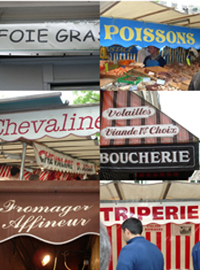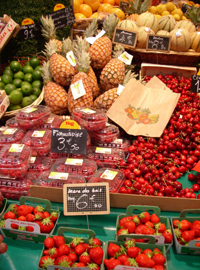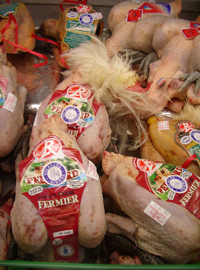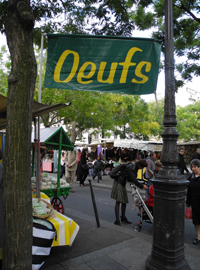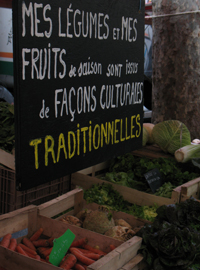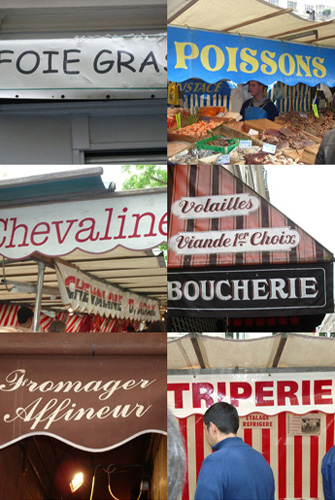Cooking On Holiday
I'm traveling again. To be more precise, I've traveled in order to stay put. We've rented a little apartment in Aix-en-Provence, a small city about three hours south of Paris in the heart of Provence. It has a view of the Cours Mirabeau, Aix's elegant and tree-lined main street, and a well-equipped kitchen. Equally important to me, it's only a quick walk to the city's main food and flower markets.
This current trip to France has been in the planning for about a year, which probably explains why the last two cookbooks I reviewed had either "French Kitchen" (Patricia Wells) or "Paris Kitchen" (David Lebovitz) in their titles. I appreciate that cooking when on vacation is not everyone's idea of a holiday. But it is for me. While others might want a break from cooking, for me getting to work with local ingredients remains a sweet pleasure when visiting somewhere foreign that has a rich food culture.
When I first began to travel I'd seek out local markets, walking through them as if they were museums. Maybe I'd purchase a souvenir jar of honey or a box of strawberries to eat on the walk back to the hotel, but mostly I remained a frustrated food witness. The solution to this ingredient lust, of course, is to stay in a place with a kitchen. But it's not the only way to explore local food in an unfamiliar place.
A couple of years ago my husband and I spent 16 days in Istanbul. It was our second visit there, the first having been at the tail of a trip to Greece, a quick three-day greatest-hits kind of visit: Blue Mosque-Hagia Sophia-Grand Bazaar-Topkapi Palace-Basilica Cistern-Buy A Rug. On our 16-day return trip, we stayed in a small hotel in the old city and ate all our meals out.
So why not a kitchen in Istanbul? First, we didn't know this mysterious and huge city (14 million population in an area the size of LA County) well enough to navigate its food markets, although after more than two weeks of wandering its streets and waterways, we came to know it a little. Moreover, I wanted to explore Turkey's eclectic regional cuisines and decided that the best way to do this was by eating local instead of cooking local. We discovered Black Sea swordfish, Circassian chicken, raki, urfa pepper, meatballs with cherries, kebabs, and simits. I fell in love at every meal.
We got some help cracking Istanbul's food code from the knowing folks at Istanbul Eats (see our link). If you're heading there, buy their book, study their website, and early in your stay, take one of their walking food tours.
My cooking tilts to Europe and so I am more familiar with European flavors, methods, and ingredients. If I were to travel to Asia or South America or the Middle East, where I am less familiar with both food and local conditions, I'd do as we did in Istanbul: get help with exploring the indigenous cuisines (every big city has food tours), be adventuresome with restaurant eating, and on each first visit I'd ponder whether this would be a place where my own cooking would add to the holiday or limit it.
Choosing Your Holiday Kitchen
While my overseas cooking experience has been primarily in Italy and France, the lessons I've learned along the way can be useful no matter where you are. This is especially the case when it comes to advance planning.
First, if you're renting an apartment from one of the on-line agencies like VRBO.com, RentVillas.com, or HomeAway.com, pay attention to the kitchen details before you commit. The apartment may be in a great location with a lovely view, but when a listing says the kitchen is fully equipped, sometimes things can get lost in translation. Specifically, make sure "oven" doesn't mean microwave. Many travelers rent apartments but not to cook much beyond reheating take-out from a salumeria or traiteur. The landlords know this and thus don't install a real oven. Certainly we home cooks can manage to make a good meal using only a cooktop, but if you want the pleasure of roasting a Bresse chicken, or tiny baby beets so fresh that they haven't yet turned to sugar, then a microwave just won't do. So check appliance details before you sign the contract.
Also, not on topic but while the memories make me wince, always ask if the apartment is directly across the street from a grammar school with a big schoolyard and outdoor after school programs. Or over a soccer bar. Trust me. These are good questions to ask.
Next, since you know the tools you need to make a meal, if you're not sure the holiday kitchen has them, bring your own. I always ask the owner or rental agent how the kitchen is equipped and I get specific: does it have at least one large pot with a cover, a 10 or 12-inch skillet, colander, dishes and glasses, salad and serving bowls, vegetable peeler, knives (and are they sharp?), cutting board, scissors, a baking dish, wooden spoon, spatula, and anything else you consider basic.
If when you arrive the pots and pans are either not adequate or in bad shape, ask the agent for what you need or consider buying replacements. Case in point: a couple of trips ago we rented an apartment in Rome, a short walk from the Campo di Fiori. The kitchen was actually quite good and well equipped but the 12-inch fry pan was a wrecked non-stick with most of the Teflon peeling off. I thought it was risky to use so I headed to the neighborhood hardware store and bought an inexpensive replacement (about $15). I could have asked the agent to replace the pan but buying it myself was faster, plus I got exactly what I wanted and it was good enough for ten days. I didn't have room in my luggage to bring the pan home so I simply left it as a gift to the next incoming tenants.
My Traveling Kitchen Toolkit
No matter how much the rental agent may assure me that their knives are sharp and the kitchen ready for Thomas Keller, I pack a cooking toolkit into my checked luggage. As long as I have basic cookware, an oven, cooktop, and a source for great ingredients, with my toolkit I know I can enjoy making a satisfying meal. Here's what I bring:
- A chef's knife. With this one knife I can do anything. Chop garlic, section a lemon, carve a roast, cut an apple, and slice bread, albeit imperfectly. I don't bring my best Shun 10" knife (luggage gets lost and I couldn't bear to lose that one), but I'll bring another. I'll sharpen it before packing, put a cardboard sleeve around the blade, wrap it in tee shirts, and pack it in my checked bag.
- About 3 feet of cotton butcher's twine. Used to tie the legs of a chicken or a small roast or a bouquet of thyme and parsley to add to a tray of roasted root vegetables.
- Corkscrew. A small one that I can also toss into my shoulder bag if we're doing a day or overnight trip or going on a picnic.
- Instant thermometer. This is essential when cooking chicken or other roasts in an unfamiliar oven. If I had to choose one thing on this list to bring, this would be it.
- Microplane rasper. This may seem extravagant but I've found that it's a versatile tool for grating cheese, zesting lemons, and grating garlic or onion.
- Red pepper flakes. Most rental kitchens will come with salt and pepper, sometimes even a nice peppermill. But if I want to add heat to a marinade, sauce, or vegetables, a quick way is with red pepper flakes. I don't want to have to buy a large packet only to fuss about bringing leftovers home, especially since I just bought a large jar of them. Three tablespoons in a Ziplock will easily last two weeks. Or you could bring a bottle of Tabasco but pack it carefully and check it, or else a TSA agent will bust you and just try to buy a replacement bottle of Tabasco in some hill town in Umbria.
- A tube of Dijon mustard. If you're in France you can buy this at the grocery but otherwise, I bring my own. We eat salads with almost every dinner and my favorite vinaigrette is made with 2 tablespoons red wine vinegar with a big pinch of salt, several grinds of black pepper, and a forkful of mustard (about 1 teaspoon); add 5 tablespoons extra virgin olive oil and whisk with the same mustard fork until emulsified. This works on a salad of mixed lettuces, plate of sliced tomatoes, bowl of still warm steamed potatoes and green beans, thin pieces of fennel tossed with canned tuna, or a tre colore salad (arugula or romaine, endive, radicchio). So for me Dijon mustard is an essential and a tube -- sealed in a plastic bag -- is easy to transport (and I don't have to buy a jar locally and leave anything behind).
- Tea bags. Many rented kitchens will include basics like coffee and tea, but just in case they don't, and for our first morning in an unfamiliar place, I make sure I have some of my favorite Fortnum & Mason Earl Grey Classic.
- Reusable shopping bag. The best, like old-fashioned string bags, pack small but become big.
- A half-dozen or so empty Ziplock plastic storage bags, both gallon and quart sizes.
- One cookbook. Since WiFi is ubiquitous, I can always get a recipe or check internal temperatures for meats, but I still want a knowing voice to help me connect flavor with place. When I cook in Italy, I bring Marcella Hazan. In Spain, José Andrés. And to Provence I have brought Patricia Wells and her Simply French, my favorite of all her books.
An Instant Pantry
Whenever we rent a kitchen, soon after we arrive I head out to do my first food shop with a list of essentials. These are mostly pantry ingredients that will help me make something out of whatever it is I later find that is fresh and inspiring at an open air market. Some of these I'll buy at the market, others I'll get at the grocery, but here's what is always on my list:
- Lemons. At least two. To stuff into a chicken, squeeze over a salad, grate zest over seafood, slice thin and scatter among a sheet pan of roasted little potatoes and trimmed artichokes, or cut a wedge to add to an icy glass of sparkling water.
- Garlic.
- Onions. One red for salad. One yellow for cooking.
- Extra virgin olive oil. Give yourself the treat of buying a good local one that can be used to dress a salad, sauté vegetables, drizzle on bread, or rub on poultry before cooking.
- Red wine vinegar. I buy the smallest bottle knowing I'll never use it all.
- Salt and pepper (if there's none in the apartment). Look for whole peppercorns that come in a glass jar with a grinder in its cap. Choose fine sea salt for its versatility.
- Yogurt. For breakfast. Many European yogurts are full-fat, not low fat. I pretend I don't notice and buy it anyway.
- Butter. For cooking and for breakfast toast. And maybe with radishes and salt, one of the world's most perfect food combinations.
- Mineral water. Both still and sparkling.
- Coffee.
- Wine.
- Bread.
- Paper towels. If there's no salad spinner (there usually isn't) I'll use the towels to dry lettuce leaves, plus to wipe mushrooms clean, pat a piece of meat dry before adding it to a hot pan, drain bacon or anything fried.
With this basic pantry in place, I can be adventuresome and serendipitous when I head to the markets. And while it may be obvious, these are items that work for me but you would choose your own based upon where you're traveling and how you cook. Where I buy vinegar, you may want fish sauce, or ginger instead of onions, and so on.
Cooking Local
Here's my most important advice: when you check into your apartment, in addition to getting instructions on running the dishwasher and where to put the trash, ask about local food sources -- a grocer, bakery, wine store, butcher and/or fish store, farmers markets, and specialty stores depending upon where you are. Such as cheese shops in France or fresh pasta shops in Italy. And then when you shop at these specialty stores, ask the merchants for more suggestions.
After all, isn't this the point? To cook with the best ingredients available in a country that has a rich food culture (as opposed to grocery cart races with Guy Fieri). In Florence, which from a cooking perspective I feel like I now know as well as NYC, I've met all my favorite food merchants through recommendations. It's like playing telephone: Find a friendly pasta maker. Ask her for her favorite butcher. Ask him where to buy prosciutto and cheese. Ask the cheesemonger for where to buy a chicken. And before you know it -- allora -- you are shopping like a local.
In case at this point you're saying, "well that's fine but I don't speak [Italian, French, Greek, etc.]. Not to worry. Learn the words of basic politeness -- hello, please, thank you, where, how much. Make an effort to communicate. Point. Hold up fingers. And smile. You'll do fine.
When getting local details, also ask about when shops and markets are open as in many places the food stores aren't always open. For example, in Florence the Mercato Centrale, next to the Basilica di San Lorenzo, is open from 7:00 am to 2:00 pm, except on Saturdays when it's open to 5:00 pm and Sundays when it's closed. Most Italian neighborhood shops will open early, close mid-day, from about 1:00 to 4:00 pm, and then re-open until around 7:00 pm.
If cooking in an unfamiliar city and an unfamiliar kitchen seems daunting, take the pressure off yourself and cook simply. Shopping at a farmers market means you'll have bought superb vegetables so make them in a plain way. If it's spring and you come upon just-picked peas, buy a couple of pounds (which is about a kilogram; one pound is a half-kilo, or in French -- un demi-kilo), and on the same day, shuck them, producing about 3/4 pound of peas. Cook them quickly in salted water, drain, and honor them with a knob of local butter. No performance-driven chef can make anything that will taste as good. Do the same with carrots, or sauté sliced zucchini with that good olive oil you bought, plus paper-thin slices of garlic and a pinch of the red pepper you brought from home.
Another tip: combine cooked foods with ones already prepared. Many bakeries sell gorgeous pizzas and focaccias by the slice. Add this to a platter of local cured ham and cheese and then make a salad to complete the meal. Some farmers markets offer rotisserie chickens, just like we have here at home except that these chickens will be the best you've ever tasted. A few also sell potatoes that have cooked in the drippings below the rotating chickens, giving take-out a whole new status.
But roasting your own is an easy way to cook in an unfamiliar kitchen. If the oven intimidates you, remember that 180° Celsius is equivalent to 350° Fahrenheit. My favorite butcher in Florence, Emilio Giunti in the Mercato Centrale, sells gorgeous legs of baby lamb and fennel-tinged pork sausages, but if asked he'll tell you to cook everything at 200° C, or 400° F. That may be too high which is why you bring a thermometer.
A final recommendation: even if you are, like me, happy to make most dinners in your temporary home, please also explore the restaurants. Whether you splurge with meals by famous chefs or seek out family-owned little neighborhood spots, eat food cooked by the locals. This is how we train our palates and experience new tastes that we can then bring home to our own city kitchens.
If you have room in your bag for one more thing, I suggest a small diary. You may already keep a travel diary, but what I'm suggesting is whether you're cooking or eating every meal out, keep notes about your food experiences. Note little impressions about the farmers or the butchers, maybe their names or a description of their family helping at the market. Write down what things taste like. How tangy is the curd in the lemon tarts you've eaten every afternoon for a week? Does the fragrance of the slice of orange in a chilled glass of Lillet sweeten its soft bitter flavor? And why can't I find a veal hanger steak like they sell in Paris anywhere in New York City? Describe the smells and textures, the wine stores and the cheese shops. Ask how things are made or where they come from. This is how I learned that a favorite green olive tapenade, bought repeatedly at a Paris outdoor marché on Boulevard Raspail, includes fresh basil (and now, so does mine).
Make your travel diary about the flavors of your travels and how you felt about them at the time. This will not only help you save your memories, it will also make you a better cook. At least it did for me.
À bientôt!
